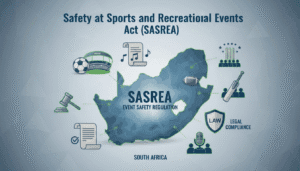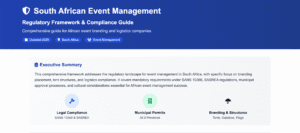Reporting on corporate events is essential for evaluating their success and impact, and it plays a crucial role in the event lifecycle. Event reports, whether in the form of reports, presentations, or emails, provide stakeholders with valuable data on how the event achieved its goals. Unlocking the power of reporting on corporate events can take your event coverage to the next level, boosting your brand’s reputation and driving business success in South Africa.
Corporate event planners face various challenges, including budget constraints, generating new ideas, and demonstrating return on investment (ROI). To overcome these challenges when reporting on corporate events in South Africa, it is important to consider key factors that contribute to the success of an event. Understanding the priorities of corporate event attendees, such as networking, learning, and entertainment, is essential for aligning event reporting strategies with their needs.
Measuring the success of a corporate event is crucial for evaluating its impact. Key metrics, such as attendee satisfaction, objective achievement, and adherence to budget, provide insights into event effectiveness. Additionally, increasing event reachability through various strategies, including social media, email marketing, websites, and influencer collaborations, can amplify the impact of your corporate events.
Choosing the right venue is another vital aspect to consider when reporting on corporate events. Accessibility is a key factor that can significantly impact the success of an event. The right venue can enhance the attendee experience and facilitate effective reporting in South Africa.
Staying organized throughout the event planning process is essential for successful event reporting. An event planning checklist can help event planners stay on track and ensure all necessary tasks are completed. By following a comprehensive checklist, you can maximize the effectiveness of your event reporting in South Africa.
- Reporting on corporate events is crucial for evaluating their success and impact.
- Event reports provide stakeholders with valuable data on how goals were achieved.
- Corporate event planners face challenges such as budget constraints and demonstrating ROI.
- Understanding attendee priorities helps align event reporting strategies with their needs.
- Measuring event success through metrics like attendee satisfaction and objective achievement is essential.
The Value of Event Reporting
Event reporting is a valuable tool that provides stakeholders with data on how a corporate event met its objectives. Whether it’s a conference, seminar, or product launch, reporting on corporate events allows businesses to assess the success of their efforts and make informed decisions for future events. By analyzing key metrics such as attendee satisfaction, objective achievement, and adherence to budget, event reports offer valuable insights into the effectiveness of event planning and execution.
One of the main benefits of event reporting is its ability to showcase the return on investment (ROI) for corporate events. By quantifying the impact of an event, businesses can determine if their resources were well allocated and if the event successfully achieved its intended goals. This data is crucial for making strategic decisions, allocating budgets, and justifying future event investments.
“Event reports provide stakeholders with valuable information on how an event achieved its goals.”
Furthermore, event reporting solutions enable businesses to identify areas of improvement and implement necessary changes. Through detailed analysis of event data and feedback, event planners can identify strengths and weaknesses, allowing them to refine their strategies and enhance future event experiences. Whether it’s adjusting the program schedule, improving communication channels, or enhancing event logistics, event reports serve as a foundation for continuous improvement.
To illustrate the significance of event reporting, let’s consider a hypothetical scenario. ABC Corporation recently organized a product launch event attended by key industry professionals. By generating a comprehensive event report, ABC Corporation was able to demonstrate that 90% of attendees rated the event as highly satisfactory. Additionally, the report highlighted that the event successfully generated 50% more leads compared to the previous year’s product launch event. Armed with this data, ABC Corporation was able to impress stakeholders, justify their event investment, and make strategic decisions for future product launches.
| Benefits of Event Reporting |
|---|
| Assesses the success of corporate events |
| Provides data on attendee satisfaction, objective achievement, and adherence to budget |
| Showcases the return on investment (ROI) for corporate events |
| Identifies areas of improvement and allows for strategic decision-making |

Consistency and effectiveness are key when it comes to event reporting. By establishing a standard event reporting guide, businesses can ensure consistency in data collection, analysis, and reporting across all events. This allows for easier comparisons, benchmarking, and trend analysis. Effective event reporting involves clear communication, concise presentation of data, and actionable insights that drive future event strategies.
- Clearly define objectives: Clearly outlining the objectives of the event is essential for effective reporting. This ensures that metrics and data collected align with the intended goals, providing stakeholders with meaningful insights.
- Utilize technology: Leveraging event reporting solutions and tools can streamline data collection, analysis, and reporting. From online surveys to event management platforms, technology can simplify the reporting process and provide real-time data.
- Engage with stakeholders: Regular communication with stakeholders throughout the reporting process is crucial. This allows for collaboration, feedback, and a deeper understanding of their expectations, ensuring that the event report meets their needs.
In summary, event reporting is a valuable tool that helps businesses assess the success of their corporate events, showcase ROI, identify areas of improvement, and make informed decisions for future events. By implementing consistent and effective event reporting practices, businesses in South Africa can enhance their event planning strategies and drive greater business success.
Key Considerations for Corporate Event Planners
Corporate event planners have to navigate various challenges to ensure a successful event, and effective reporting plays a crucial role in addressing these concerns. One of the main challenges faced by event planners is managing the event budget. According to the latest corporate event news, controlling costs while delivering a memorable event experience requires careful planning and resource allocation. By tracking expenses and comparing them to the allocated budget, event planners can identify areas where adjustments can be made to maximize resources and minimize unnecessary expenditures.
Another key consideration for event planners is generating fresh ideas and creating unique event experiences that resonate with attendees. This can be achieved through market research, staying up-to-date with industry trends, and incorporating innovative technologies into event design. Collaboration with event coverage services can also prove beneficial, as their expertise in event planning and reporting can bring new perspectives and ideas to the table.
Return on investment (ROI) is another critical factor that event planners must consider. Determining the success of an event goes beyond measuring attendee satisfaction. It involves evaluating the objectives set for the event and assessing whether they have been achieved. With the help of event reporting services, planners can analyze attendee feedback, track key performance indicators, and measure the overall impact of the event. This data-driven approach ensures that future events can be optimized to deliver maximum ROI.
How to Overcome These Challenges?
To overcome budget constraints, event planners can create a detailed budget plan and regularly monitor expenses. Utilizing event management software or working with event coverage services that offer comprehensive budgeting tools can streamline the process and provide real-time budget tracking. Additionally, exploring sponsorship opportunities and strategic partnerships can help offset costs and provide additional resources.
Generating new ideas and creating unique event experiences can be facilitated by networking with industry professionals, attending conferences, and staying attuned to emerging trends. Collaborating with event coverage services that specialize in creative event planning can also provide fresh perspectives and innovative solutions.
For ROI assessment, event planners should establish clear objectives for each event and develop a framework for measuring success. This can include post-event surveys, data analytics, and tracking conversions. Partnering with event reporting services that offer comprehensive analytics and reporting capabilities can provide valuable insights into attendee behavior and help measure the overall impact of the event.
| Challenges | Strategies |
|---|---|
| Budget constraints | – Create a detailed budget plan – Regularly monitor expenses – Explore sponsorship opportunities and partnerships |
| Generating new ideas | – Network with industry professionals – Attend conferences and stay attuned to trends – Collaborate with event coverage services |
| Return on investment (ROI) | – Establish clear objectives for each event – Develop a framework for measuring success – Partner with event reporting services for comprehensive analytics |
In conclusion, effective reporting is vital for corporate event planners to address their concerns and ensure successful events. By managing budgets, generating fresh ideas, and measuring ROI, event planners can optimize resources and deliver exceptional experiences that leave a lasting impact on attendees. Collaborating with event coverage services can offer valuable insights and expertise to help overcome these challenges and achieve event success.

To create comprehensive event reports, it’s important to consider the priorities and expectations of the attendees. Understanding what drives their engagement and satisfaction can help event planners tailor their reporting strategies to deliver impactful results. Here are some key priorities for corporate event attendees:
- Networking: Attendees value opportunities to connect and build relationships with industry peers. Facilitating networking sessions or providing dedicated spaces for networking can enhance attendee experience and foster meaningful connections.
- Learning: Corporate events provide a platform for attendees to gain insights, knowledge, and expertise in their field. Offering educational sessions, keynote speeches, and workshops can meet the attendees’ thirst for knowledge and industry trends.
- Entertainment: While educational content is important, attendees also appreciate entertainment and engaging experiences. Incorporating entertaining elements such as live performances, interactive games, or captivating presentations can boost attendee satisfaction and make the event more memorable.

Attendees value events that bring together industry leaders, provide valuable learning experiences, and offer opportunities for meaningful connections. By aligning your event reporting strategies with these priorities, you can enhance attendee satisfaction and maximize the impact of your corporate events.
Testimonials from Satisfied Attendees
| Attendee | Company | Testimonial |
|---|---|---|
| John Smith | ABC Corporation | “The event provided an excellent platform for networking. I met industry leaders and made valuable connections that have benefitted my career.” |
| Jane Doe | XYZ Enterprises | “The educational sessions were insightful, and I gained valuable knowledge and skills that I can apply in my role. The event exceeded my expectations.” |
| Michael Johnson | 123 Corporation | “The event had a perfect balance of educational content and entertainment. I left feeling inspired and motivated, and it was a great platform to learn and have fun.” |
By prioritizing networking, learning, and entertainment, event planners can create immersive experiences that resonate with attendees. Incorporating these priorities into event reporting ensures that stakeholders understand the value and impact of the event on participants.
Measuring Event Success
Measuring event success goes beyond attendance numbers and requires a comprehensive approach to evaluate impact and ROI. To effectively measure the success of a corporate event in South Africa, event planners must consider key metrics such as attendee satisfaction, objective achievement, and adherence to budget.

Attendee satisfaction is a vital indicator of an event’s success. Collecting feedback through post-event surveys or evaluations allows event planners to gauge attendee experience and identify areas for improvement. By analyzing this data, event planners can make informed decisions for future events, ensuring that attendees have a positive experience and are more likely to recommend or attend future events.
Objective achievement is another critical measurement of event success. Whether the objective is to generate leads, increase brand awareness, or promote a new product, event planners should track and analyze relevant data to determine if these objectives were met. This can include metrics such as lead generation, social media engagement, or sales figures directly attributed to the event.
Lastly, staying within budget is a crucial aspect of measuring event success. Tracking expenses and comparing them to the allocated budget allows event planners to evaluate cost efficiency. By identifying areas of overspending or savings, event planners can make adjustments for future events and ensure optimal resource allocation.
| Metric | Method of Measurement |
|---|---|
| Attendee Satisfaction | Post-event surveys or evaluations |
| Objective Achievement | Tracking relevant metrics (e.g., lead generation, social media engagement, sales figures) |
| Adherence to Budget | Expense tracking and comparison to allocated budget |
By taking a holistic approach to measuring event success and considering these key metrics, event planners in South Africa can gain valuable insights into the effectiveness of their corporate events. This data-driven approach allows for continuous improvement, ensuring that events deliver maximum impact and drive business success.
Boosting Event Reachability
To ensure your event reporting reaches a wider audience, it’s important to employ a mix of marketing strategies tailored to your target audience in South Africa. By utilizing various channels, you can maximize the reach and impact of your corporate events.
Social media: Leverage popular platforms such as Facebook, Twitter, LinkedIn, and Instagram to promote your event, engage with attendees, and share live updates. Create engaging content, including event teasers, behind-the-scenes footage, and testimonials, to generate buzz and attract attention.

“Social media is a powerful tool for event promotion and coverage. It allows you to interact with your target audience in real-time and build excitement leading up to the event.”
Email marketing: Build an email list of interested individuals and use targeted email campaigns to keep them informed about your event. Incorporate compelling visuals, personalized messages, and clear calls to action to drive registration and attendance.
Websites and event registration sites: Create a dedicated event page on your website with detailed information, including the event agenda, speakers, and registration details. Additionally, leverage event registration sites to extend your reach and tap into their existing user base.
Key Strategies for Event Reachability
- Paid ads: Consider investing in paid advertisements on platforms like Google Ads or social media platforms to increase event visibility. Target specific demographics and interests to ensure your message reaches the right audience.
- Video marketing: Use video content to capture the essence of your event and showcase highlights. Share videos on social media, email campaigns, and your website to engage with potential attendees.
- Influencer collaborations: Collaborate with influencers or industry experts who align with your event’s theme or target audience. Their endorsement and promotion can significantly boost event reach and credibility.
- Telephone marketing: Consider reaching out to potential attendees via telephone to provide personalized event information and address any questions or concerns they may have.
By implementing these strategies, you can effectively increase the reach and impact of your corporate events, ensuring your event reporting reaches a wider audience and drives meaningful results in South Africa.
| Key Strategies for Boosting Event Reachability | Description |
|---|---|
| Social media | Leverage popular platforms to promote your event and engage with attendees. |
| Email marketing | Build an email list and use targeted campaigns to keep potential attendees informed. |
| Websites and event registration sites | Create a dedicated event page and utilize registration sites to expand your reach. |
| Paid ads | Invest in paid advertisements to increase event visibility and target the right audience. |
| Video marketing | Use engaging videos to showcase event highlights and attract potential attendees. |
| Influencer collaborations | Collaborate with influencers to boost event reach and credibility. |
| Telephone marketing | Reach out to potential attendees via telephone for personalized communication. |
Choosing the Right Venue
The venue selection is a critical component of corporate event planning and can greatly influence event success and subsequent reporting. When choosing a venue for your event, it is important to consider factors such as accessibility, capacity, and ambiance. South Africa offers a diverse range of venues, from luxurious hotels to unique outdoor spaces, each with its own set of advantages and considerations.
Accessibility should be a top priority when selecting a venue for your corporate event. Consider the location and transportation options available to attendees. Is the venue easily accessible by public transport or does it have adequate parking facilities? Ensuring that your venue is conveniently located will encourage greater attendance and participation, ultimately enhancing the success of your event.
“The venue selection is a critical component of corporate event planning and can greatly influence event success and subsequent reporting.”
Capacity is another important factor to consider when choosing a venue. You want to ensure that the venue can comfortably accommodate your anticipated number of attendees. Assess the available seating options, meeting rooms, and any additional spaces required for networking or breakout sessions. It is also essential to check if the venue can provide the necessary audiovisual equipment and technology for your event’s requirements.
Lastly, the ambiance of the venue plays a significant role in creating a memorable experience for your attendees. Consider the overall atmosphere, architecture, and interior design of the venue. Does it align with the theme or purpose of your event? A visually appealing venue can enhance engagement, encourage networking, and leave a positive impression on attendees, all of which contribute to the success of your event and subsequent reporting.

| Venue | Capacity | Location | Ambiance |
|---|---|---|---|
| ABC Conference Center | 500 | City Center | Modern, professional |
| XYZ Hotel | 300 | Beachfront | Elegant, ocean view |
| DEF Convention Center | 1000 | Suburbs | Spacious, versatile |
Staying Organized with an Event Planning Checklist
An event planning checklist is a valuable tool that aids in staying organized and ensures no crucial tasks are overlooked when reporting on corporate events. By following a comprehensive checklist, you can streamline your event planning process and ensure that all necessary components are addressed.
Here is a month-by-month outline of the key tasks to include in your event planning checklist:
- 6-12 months before the event: Set clear goals and objectives for your corporate event. Determine your budget and start researching potential venues.
- 4-6 months before the event: Finalize the event date and secure the chosen venue. Develop a detailed event timeline and create a marketing plan to generate buzz.
- 2-4 months before the event: Select and confirm vendors, such as caterers, audio-visual providers, and photographers. Develop a comprehensive event program and start promoting registration.
- 1-2 months before the event: Coordinate with speakers, sponsors, and exhibitors to ensure smooth logistics. Finalize event materials, including badges, signage, and handouts.
- 2-4 weeks before the event: Send out event reminders to registered attendees and gather final RSVPs. Create a detailed event day schedule and conduct a thorough run-through of all activities and presentations.
- 1 week before the event: Double-check all arrangements, including event setup, catering, and audio-visual equipment. Confirm any last-minute logistical details with vendors.
- Event day: Ensure that all event elements are set up according to plan and that all staff and volunteers are briefed on their roles. Be available to handle any on-the-day issues or emergencies.
- Post-event: Gather feedback from attendees and stakeholders. Evaluate the success of the event based on your objectives and metrics. Prepare and distribute event reports to key stakeholders.
By using this event planning checklist, you can stay organized and ensure that every aspect of your corporate event is well-executed and reported on effectively. Remember to adapt the checklist to suit the specific requirements of your event, as each occasion will have unique considerations.
Example of a Completed Table
| Month | Tasks |
|---|---|
| 6-12 months before the event | Set goals and objectives, determine budget, research venues |
| 4-6 months before the event | Finalize event date, secure venue, develop event timeline and marketing plan |
| 2-4 months before the event | Select and confirm vendors, develop event program, promote registration |
| 1-2 months before the event | Coordinate with speakers, sponsors, and exhibitors, finalize event materials |
| 2-4 weeks before the event | Send event reminders, create event day schedule, conduct run-through |
| 1 week before the event | Double-check arrangements, confirm details with vendors |
| Event day | Ensure event elements are set up correctly, handle on-the-day issues |
| Post-event | Gather feedback, evaluate success, prepare and distribute event reports |
By using this event planning checklist in your corporate event reporting process, you can stay organized and ensure that no crucial tasks are overlooked. This will ultimately contribute to the success of your event and the effectiveness of your reporting efforts.

Effective reporting on corporate events is a powerful tool that can enhance your brand’s reputation and drive business success, and understanding the key considerations and strategies is crucial for achieving impactful event coverage in South Africa.
By creating comprehensive event reports in various formats, such as reports, presentations, and emails, you can provide stakeholders with valuable data on how your event achieved its goals. This standardized approach ensures consistency and provides a common language for discussing event success.
When planning corporate events, it is essential to address the main concerns of budget constraints, generating new ideas, and demonstrating return on investment (ROI). By overcoming these challenges, you can ensure that your event delivers the desired outcomes and meets the expectations of both attendees and stakeholders.
To create an unforgettable experience for event attendees, it is important to align your event reporting strategies with their priorities. Networking opportunities, educational sessions, and entertainment options should be incorporated into your event program and reflected in your reporting efforts.
Measuring the success of your corporate event is essential for evaluating its impact and making informed decisions for future events. By tracking metrics such as attendee satisfaction, objective achievement, and adherence to budget, you can gain insights into the effectiveness of your event and make necessary adjustments for continuous improvement.
Expanding the reach of your corporate events is crucial for maximizing their impact. Utilize various strategies, including social media, email marketing, websites, event registration sites, paid ads, video marketing, influencer collaborations, and telephone marketing, to ensure that your event reaches a wide audience and generates the desired level of engagement.
Choosing the right venue is a critical decision that directly affects the success of your corporate event and its reporting. Consider factors such as accessibility, facilities, and ambiance to create a memorable experience for attendees and facilitate effective reporting.
Staying organized throughout the event planning process is essential for successful event reporting. By following a month-by-month event planning checklist, you can ensure that all necessary tasks are completed on time, allowing you to deliver a seamless event and produce accurate and comprehensive reports.
In conclusion, effective reporting on corporate events requires a holistic approach that considers the key considerations and strategies discussed in this article. By implementing these best practices, you can elevate your event coverage to new heights, enhance your brand’s reputation, and drive business success in South Africa and beyond.
FAQ
What is the importance of reporting on corporate events?
Reporting on corporate events is essential for determining the success and impact of the event, and it provides valuable data to stakeholders.
What forms can event reports take?
Event reports can take the form of reports, presentations, or emails, depending on the preferences and needs of the stakeholders.
What are the main concerns for corporate event planners?
The main concerns for corporate event planners include budget, generating new ideas, and demonstrating return on investment (ROI).
What are the priorities for corporate event attendees?
Corporate event attendees prioritize networking, learning, and entertainment when attending events.
How can the success of an event be measured?
The success of an event can be measured through attendee satisfaction, achieving objectives, and staying within budget.
What strategies can be used to increase event reachability?
Event planners can use social media, email marketing, websites, event registration sites, paid ads, video marketing, working with influencers, and telephone marketing to increase event reachability.
Why is choosing the right venue crucial for event success?
Choosing the right venue is crucial as it can significantly impact the success of a corporate event, with accessibility being a key factor.
How can event planners stay organized during the planning process?
Event planners can use a month-by-month event planning checklist to stay organized and ensure all necessary tasks are completed.
What are the challenges and strategies for successful events?
The challenges and strategies for successful events are universal and can be applied in South Africa to ensure successful event reporting.
How Can Product Launches Be Incorporated into Corporate Event Reporting?
Corporate event reporting can be enhanced by incorporating successful new product launches. By showcasing these launches during events, companies can generate excitement and buzz among attendees. This strategy not only offers a platform to highlight these products but also provides an opportunity for valuable feedback and networking. Including product launches in corporate event reporting helps to create a dynamic and engaging atmosphere, fostering lasting impressions and potential business opportunities.




